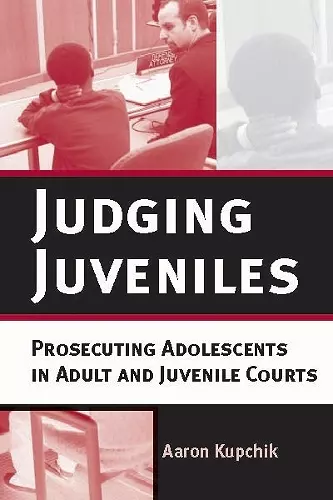Judging Juveniles
Prosecuting Adolescents in Adult and Juvenile Courts
Format:Paperback
Publisher:New York University Press
Published:20th Nov '06
Currently unavailable, and unfortunately no date known when it will be back

2007 Ruth Shonle Cavan Young Scholar Award presented by the American Society of Criminology
2007 American Society of Criminology Michael J. Hindelang Award for the Most Outstanding Contribution to Research in Criminology
By comparing how adolescents are prosecuted and punished in juvenile and criminal (adult) courts, Aaron Kupchik finds that prosecuting adolescents in criminal court does not fit with our cultural understandings of youthfulness. As a result, adolescents who are transferred to criminal courts are still judged as juveniles. Ultimately, Kupchik makes a compelling argument for the suitability of juvenile courts in treating adolescents. Judging Juveniles suggests that justice would be better served if adolescents were handled by the system designed to address their special needs.
In this important, clearly written and well-researched book, he argues that treating juveniles as adults conflicts with cultural ideas about youthfulness, resulting in an ambivalent and contradictory response by the court. -- Jamie J. Fader,University of Pennsylvania
An extremely well written book that will make an important and unique contribution. -- Richard E. Redding,co-editor of Juvenile Delinquency: Prevention, Assessment, and Intervention
An important book that will make a valuable contribution. Policy makers and students of the criminal justice system would be most wise to consider this book if they wish to understand what it really means to prosecute juveniles as if they were adults. -- Simon Singer,author of Recriminalizing Delinquency: Violent Juvenile Crime and Juvenile Justice Reform
This book asks basic questionswhat difference does the label we put on the court make in an institution's treatment of young offenders? What sorts of cases and what sorts of kids are transferred from juvenile to criminal court systems? What effects on youth are associated with different types of court? Close observation of two radically different institutional responses to youth crime breaks new ground in this empirical study of legal policy toward young offenders. -- Franklin E. Zimring,author of American Juvenile Justice
An excellent book for those exploring the juvenile justice system, and an easy read for the general public. * Choice *
ISBN: 9780814747742
Dimensions: unknown
Weight: 318g
211 pages